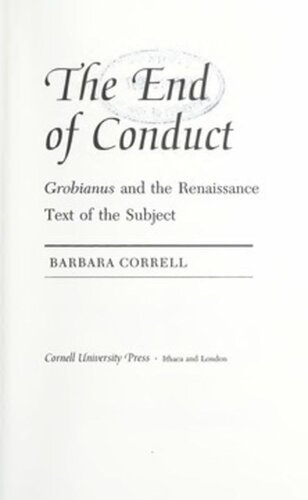

Most ebook files are in PDF format, so you can easily read them using various software such as Foxit Reader or directly on the Google Chrome browser.
Some ebook files are released by publishers in other formats such as .awz, .mobi, .epub, .fb2, etc. You may need to install specific software to read these formats on mobile/PC, such as Calibre.
Please read the tutorial at this link: https://ebookbell.com/faq
We offer FREE conversion to the popular formats you request; however, this may take some time. Therefore, right after payment, please email us, and we will try to provide the service as quickly as possible.
For some exceptional file formats or broken links (if any), please refrain from opening any disputes. Instead, email us first, and we will try to assist within a maximum of 6 hours.
EbookBell Team

5.0
58 reviewsGrobianus et Grobiana, a little-known but key Renaissance text, is the starting point for this examination of indecency, conduct, and subject formation in the early modern period. First published in 1549, Friedrich Dedekind's ironic poem recommends the most disgusting behavior—indecency—as a means of instilling decency. The poem, Barbara Correll maintains, not only supplements prior conduct literature but offers a reading of it as well; her analysis of the Grobianus texts (the neo-Latin original, the German vernacular adaptation, the 1605 English translation, and Thomas Dekker's Guls Horne-booke) also provides a historical account of conduct during the shift from a medieval to a Renaissance sensibility. According to Correll, the effect of Dedekind's text is to establish normative masculine identity through the labor of aversion. The gross, material body must be subjugated and reconstituted in order to attain its status as the bearer of civil manhood. Correll shows how the virtual subject of civil conduct emerges in dominant yet necessarily beleaguered relation to colonized Others, whether in feminine, animal, or peasant guise. Referring to Renaissance courtesy literature from Castiglione to Erasmus, she identifies this double drama of early modern subject formation as central to conduct books as well as to their grobian extensions. Her work places Grobianus in the civilizing process that marked emerging bourgeois society in early modern Europe.